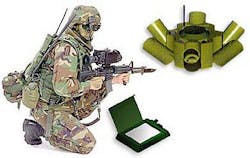Northrop Grumman picked to build improved control for networks of remote-fired grenades
PICATINNY ARSENAL, N.J., 30 Aug. 2013. U.S. Army munitions experts are asking engineers at Northrop Grumman Corp. in Herndon, Va., to design an improved remote control unit (RCU) for a network of soldier-controlled anti-personnel grenades that can sense enemy intrusions and enable warfighters to fire the explosives remotely.
Officials of the Army Contracting Command at Picatinny Arsenal, N.J., awarded a potential $12 million contract to Northrop Grumman this week engineering and manufacturing development and the low rate initial production of the improved remote control system -- a project known as Spider Increment 1A.
Northrop Grumman will provide an improved networked munitions control station for the XM-7 Spider anti-personnel networked munitions system that provides a secure remote command and control capability as far as 1500 meters for a hand-emplaced munition field.
The Spider system consists of as many as 60 munition control units (MCUs); a remote control station (RCS); and a repeater for extending communication range. Each MCU can attach as many as six individual grenades -- each of which covers a 60-arc.
Warfighters place The MCUs by hand, and an operator then can control six triplines to provide a sensing network. The operator control the network of grenades from as far away as one mile -- or farther with repeaters.
When a tripline is activated, the MCU connected to the line signals wirelessly to the operator, who can choose to fire one or more of the grenades. Operators also can turn off one, several, or all of the networked weapons in the munitions field.
Northrop Grumman engineers will retain the MCU, repeater, communications system, and other features of Spider Increment 1 to ensure backwards compatibility, and will include enhanced mapping capability; communications that link the munition field to the Army Battle Command System (ABCS); and the ability to employ existing munitions.
For more information contact Northrop Grumman Corp. online at www.northropgrumman.com, or the Army Contracting Command at Picatinny Arsenal at www.pica.army.mil.
